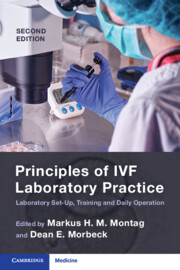Book contents
- Principles of IVF Laboratory Practice
- Principles of IVF Laboratory Practice
- Copyright page
- Contents
- Contributors
- Foreword
- The Evolution of IVF Practice
- Section 1 Starting a New Laboratory and Training Protocols
- Section 2 Pre-procedure Protocols
- Chapter 10 Mouse Embryo Assay for Quality Control in the IVF Laboratory
- Chapter 11 Sperm Survival Assay for Quality Control in the IVF Laboratory
- Chapter 12 Quality Control in the IVF Laboratory
- Chapter 13 Set-Up Procedures for Optimizing Performance in the IVF Laboratory
- Section 3 Gametes
- Section 4 Insemination/ICSI
- Section 5 Fertilization Assessment
- Section 6 Embryo Assessment: Morphology and Beyond
- Section 7 Embryo Cryopreservation
- Section 8 Embryo Transfer
- Section 9 Quality Management
- Index
- References
Chapter 13 - Set-Up Procedures for Optimizing Performance in the IVF Laboratory
from Section 2 - Pre-procedure Protocols
Published online by Cambridge University Press: 07 August 2023
- Principles of IVF Laboratory Practice
- Principles of IVF Laboratory Practice
- Copyright page
- Contents
- Contributors
- Foreword
- The Evolution of IVF Practice
- Section 1 Starting a New Laboratory and Training Protocols
- Section 2 Pre-procedure Protocols
- Chapter 10 Mouse Embryo Assay for Quality Control in the IVF Laboratory
- Chapter 11 Sperm Survival Assay for Quality Control in the IVF Laboratory
- Chapter 12 Quality Control in the IVF Laboratory
- Chapter 13 Set-Up Procedures for Optimizing Performance in the IVF Laboratory
- Section 3 Gametes
- Section 4 Insemination/ICSI
- Section 5 Fertilization Assessment
- Section 6 Embryo Assessment: Morphology and Beyond
- Section 7 Embryo Cryopreservation
- Section 8 Embryo Transfer
- Section 9 Quality Management
- Index
- References
Summary
Optimization of procedures routinely performed in a clinical human in vitro fertilization (IVF) laboratory have become increasingly important due to the increase in complexity of procedures now performed in the laboratory. The addition of new technologies requiring more oversight has increased dramatically within the last decade. As a result of incorporating these new technologies, safe and efficient operation of the IVF laboratory has become increasingly complex and requires a substantial understanding of processes within the laboratory. In today’s modern IVF laboratory, the amount of staff time to perform every increasingly complicated case has more than doubled. Similarly, the amount required time to prepare for these cases has increased dramatically as well. In many instances, the increase in complexity of laboratory procedures has not translated into hiring of new staff but the creation of challenges to improve efficiency within the laboratory. The current guidelines for allocation of staff are based upon cycle numbers performed on an annual basis, not complexity of cases performed.
Keywords
- Type
- Chapter
- Information
- Principles of IVF Laboratory PracticeLaboratory Set-Up, Training and Daily Operation, pp. 96 - 104Publisher: Cambridge University PressPrint publication year: 2023

